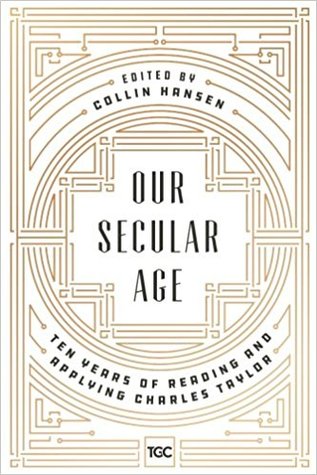The premise of Our Secular Age doesn’t have strong curb appeal: evangelical Christians grappling with the contribution of a contemporary philosopher’s nearly 900 page tome. Despite the fact that one of my favorite authors, James KA Smith has been significantly influenced by Charles Taylor, I still have yet to pick up Taylor’s A Secular Age.
Despite the less-than-enticing premise, Our Secular Age is a book that should be broadly read by Christian leaders. Even for the reader (like myself) who has no first-hand experience with Taylor, his theses are laid out clearly and the wide-ranging impact of his thought is explored and at times critiqued.
Taylor’s central thesis is that the secular world is a world that has turned its focus on the self and lost its sense of the transcendent. Collin Hansen says that Taylor traces the beginnings of this age to Martin Luther: “Taylor faults the Protestant Reformation and modern evangelical Christianity for disenchanting the world and turning the focus on the self rather than on God through and turning the focus on the self rather than on God through shared religious rituals.”
In the words of Carl Trueman, “The ultimate dynamic driving this secular age is the denial of our creatureliness and the assertion of our autonomy. The psychological self is the latest stage, allowing us to repudiate all forms of external authority – even that of our own bodies.” In the secular world, the immanent becomes the transcendent.
The payoff of this is that those in the secular world judge themselves in a mirror. John Starke says, “According to Taylor, ‘I mean by this a humanism accepting no final goals beyond human flourishing, nor any allegiance to anything else beyond this flourishing. Of no previous society was this true.” The secular individual is buffered from the transcendent: “A buffered self ‘sees itself as invulnerable, as master of the meaning of things for it.’ That last sentence is important: The self becomes the ‘master of the meaning of things.’”
Religious belief and God himself is subject to the buffered self. In Starke’s words, “If one is to believe in God or a god, it must primarily be in service to human flourishing.” It’s not hard to see how this has infected the American church. One needs only look at the bestsellers in Religion or Spirituality at Amazon to see the way in which God has been reduced to this buffered secular vision. In the words of Michael Horton, “Now we must become masters of our own destiny, keeping danger at bay by our own collective and calculative reasoning. Even if God plays a role, it is a supporting one, helping us to achieve ‘our best life now.’” More succinctly, Jen Pollock Michel says, “In the secular age, God becomes the guarantor of our best life now.”
But such a vision of spirituality is as unsatisfying as a diet of Starbucks macchiatos. Brett McCracken asks, “Can such an approach to eclectic faith, where spirituality is as customizable as a Spotify playlist or a Chipotle burrito, ever be conducive to spiritual health?” McCracken points out that, “Just as we eventually grow tired of a trendy restaurant or favorite clothing brand because our tastes inevitably change, so we will eventually tire of a church that initially connects with our unique ‘spiritual path’ but then fails to sufficiently track with our evolving beliefs.”
Worse still, Christianity isn’t just a nuisance to this version of spirituality, it is a threat. Jen Pollock Michel says, “It is not simply that Christianity is an alternate ethic in the secular age; it is an enemy.” Brett McCracken agrees: “Christianity doesn’t work on the terms of consumerism. Jesus calls his followers not to comfort and convenience, but to deny themselves and take up their cross. Christian discipleship is not consumer-friendly.”
John Starke points out just how powerful the buffered self is against the call of the gospel: “The authentic self says, ‘This is me; you must accept me as I am.’ The vulnerable self says, ‘This is me; take me and transform me.’ The vulnerable self comes in the form not merely of confession but of repentance. It looks not to self for power and affirmation, but to divine help and deliverance.”
Our calls as Christians is to engage this secular world with an awareness not just of the infection “out there” but in our own hearts and to call the world to a God who loves us so deeply that he will not allow us to be buffered from him.
God pursues us like Jesus pursued Thomas and in Collin Hansen’s words, “God continues to haunt this secular age with our desire for goodness.” “Christians still have an opportunity to present the gospel as a beautiful alternative to the cramped ideologies of immanence that dominate our landscape,” Derek Rishmawy promises.
We need look no further than the way in which our secular world struggles with faith. Mike Cosper analyzes Kanye and concludes that Kanye is “haunted by faith.” “’I’m looking for more,’” Kanye says. And the opportunity for the church in a secular age is to greet that thought with joy. Because there is so much more.”
That sounds pretty relevant to us, does it not?
Our Secular Age does not merely take Charles Taylor as he is, though. Taylor finds the root of our secular age in the Reformation. Trueman and Horton, especially, challenge this story and particularly Taylor’s dark reading of the Reformation. Horton believes that at times it appears that Horton is really choosing the enchantment of the pre-modern world over the disenchantment of the modern world, not a biblical world over a secular world. Horton asks: “[H]as Taylor himself lost confidence in the power of the Christian story – including its systematic truth claims – to determine and invigorate our practices?”
I commend Our Secular Age to you and invite you to consider yourself, your church, and your neighborhood in light of its incisive theological assessment.


